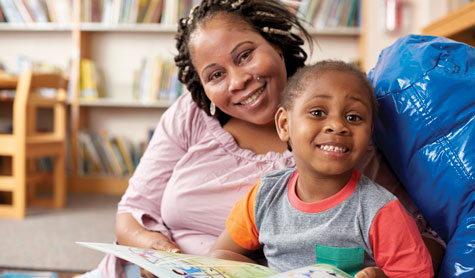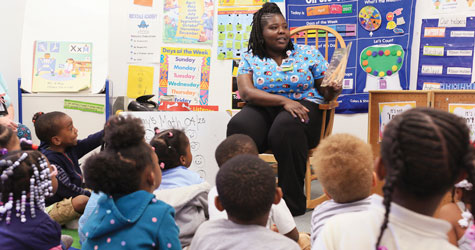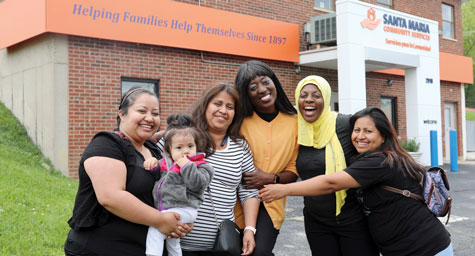Caring for our Community
Racism is a public health crisis—we’re deepening our commitment to eliminate racial inequities
The COVID-19 pandemic has had a disproportionate effect on people of color. Native American, Latino and Black communities are at an increased risk of getting sick and dying from the virus, illuminating racism as a driving force behind health inequities.
The need to address the longstanding structures that create barriers to health access has reached a critical level, but the issue goes deeper than the current pandemic. Black Americans, for example, are more likely to have and die from asthma, diabetes, heart disease and cancer than white Americans. To address these centuries-old inequities, we’re amplifying our ongoing work to improve care for children and families experiencing worse outcomes as a result of structural racism.
To best serve a diverse community, we must first look inward. As a national leader in child health, we believe that living diversity, equity and inclusion is our obligation—and our opportunity.
Over the next five years, we’re developing diversity and harnessing it through training and recruitment programs for our current and future workforce. “Diverse teams help us practice better medicine,” says Ndidi Unaka, MD, MEd, associate program director of our Pediatric Residency Training Program. ”Cincinnati Children’s is a change agent, and I’m proud to be part of this organization.”
By cultivating inclusion and implementing an enterprise-wide diversity training initiative for our 16,000 employees, we’re honing patient-centered principles to overcome implicit biases and create systemic change. Through this work, we’ll be able to provide the best possible care to families from here and around the world.
But this problem is bigger than any one institution—so we must work together.
It Takes a Village to Help All Children Thrive
“Respect everyone” is one of our Core Values. That’s why, for more than a decade, we’ve been convening experts in different fields and building networks of communication to study and address social determinants of health in our region. Together with community partners and local businesses, we’re taking action to eliminate the gap in racial health disparities.
We know that socioeconomic issues such as employment, safe and stable housing, access to healthy foods, transportation and quality education play a critical role in the well-being of children. So there’s no question that to create the healthiest generation of kids, we must first help address the basic needs of families.
One way we do this is through our All Children Thrive Learning Network (ACT), an initiative designed to foster systemic change by giving parents and families the tools they need to help kids reach their full potential.
For moms like Kadijah, ACT is an engaging network whose members connect her to resources, and for this single mom of four, the extra support has meant the world.
When COVID-19 hit, Kadijah’s full-time hours as a home health worker were cut drastically, and she worried about how to make ends meet. But then a friend introduced her to ACT, and she took comfort in knowing she had a network of connection and support.
“ACT got us through hard times by supplying books to support my kids’ reading readiness for school, resource information for help with household bills and even cleaning supplies during this pandemic,” Kadijah says. “But it’s more than that. We learn from each other and listen to guest speakers who cover important topics from parenting to mental health. They also provide childcare while parents attend meetings, which is a huge help.”
For the past two years, Kadijah has been a member of the ACT–Rising Strong parenting group, the local chapter that serves the Price Hill neighborhood. Prior to COVID-19, they connected weekly to discuss things like barriers facing families, assets and opportunities in their community, and strategies for mental and emotional well-being.
“I don’t know what I’d do without ACT,” she shares. “I can’t wait to get back to my second family once it’s safe to meet again.”
Creating a Better Future—Together
Without help from generous donors, like David and Debbie Horn, we wouldn’t be able to offer the breadth of programs we do today.
The Horns first came to Cincinnati Children’s for care for their daughter Sarah, who passed away from a rare, degenerative neurological disease. Grateful for their daughter’s care and the work we do to help families going through their darkest times, they’ve supported the medical center’s mission for years through charitable gifts.
Over the last decade, they’ve helped establish and grow our Cincinnati Child Health-Law Partnership (Child HeLP).
Child HeLP empowers families to resolve legal and social issues that negatively impact the health of their children. This starts right here in our clinics, where our primary caregivers and social workers connect those who need help to the Legal Aid Society of Greater Cincinnati.
“The medical center is positioned to play a leading role in our community as it relates to racial health inequities,” David explains. “They have the expertise and the stature in our city to be influential and improve the situation.”
Our medical-legal partnership shows patient-families how to navigate complex systems and gain the assistance they need to keep their children safe and healthy. This includes help with problems like hunger, poor housing conditions, domestic violence and inadequate special education services. Often, the resolution or management of legal and social problems contributes to improved health and well-being of the patient and family
“When you support this work,” David shares, “you’re making sure all kids in our community can grow up healthy and happy.”
More Work to Be Done
Racism was a public health crisis before COVID-19, and it will not go away after the pandemic without willful action. By engaging policymakers to help us develop and maintain programs supporting equitable health systems, we will continue acting as advocates through actions, not just words.
There’s tremendous need for community commitment as well. And for families like Kadijah’s, the time for help is now. “I want others to know that they shouldn’t be ashamed to reach out,” she says. “I hope to change minds so that more parents will take advantage of these opportunities.”
Real and raw conversations about biases need to happen at every level. By taking a strong public stance against racism and supporting vital programs that promote health equity, we can help close the disparities gap—so all kids can experience a brighter, healthier future.
For more information or to make a gift, please contact Sarah Sullivan at sarah.sullivan@cchmc.org or 513-636-5664.









